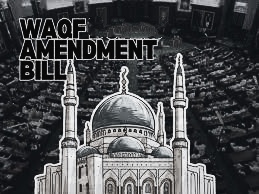The Rajya Sabha passed the Waqf (Amendment) Bill, 2025, after an intense debate lasting over 12 hours. The ruling NDA members hailed the bill as a boon for minorities, while opposition members criticized it as “anti-Muslim.” The bill, which was endorsed after rejecting all amendments proposed by the opposition, saw 128 votes in favor and 95 against. Its main provisions aim to bolster Waqf tribunals, introduce a structured selection process, and define a fixed tenure to improve the efficiency of dispute resolution. The Lok Sabha had previously cleared the bill a day earlier.
Kiren Rijiju addressed the house, emphasizing the improvements made to the bill through discussions compared to its initial draft. He highlighted that many contributors to these discussions were also part of the Joint Parliamentary Committee (JPC), whose suggestions helped refine provisions related to the collector’s case and others. Rijiju acknowledged the frustrations of JPC members, stating that consensus might not accommodate all voices, but the majority’s decisions held precedence.
Responding to claims about the BJP and NDA’s lack of concern for Muslims, Rijiju defended the bill’s focus, asserting that it aims to address the needs of poor Muslims, contrasting it with the perceived neglect by the Congress during their long tenure in power. He stressed that the bill would not interfere with Waqf properties, as it operates under the framework of a statutory body.
The Central Waqf Council will be composed of 22 members, with no more than four non-Muslim ex-officio members allowed. Furthermore, the Waqf Board will include 11 members, with a cap of three non-Muslims. Rijiju clarified that these stipulations ensure adequate representation while maintaining focus on the Waqf’s primary purpose.
Overall, the bill’s passage reflects a significant move by the government to reform Waqf management, even as it continues to spur controversy and debate regarding its implications for Muslim communities in India.
Criticizing the opposition’s stance on the Waqf Amendment Bill, Kiren Rijiju asserted that they are unwilling to accept the truth. He highlighted their claims of the bill being unconstitutional, pointing out their failure to provide reasons to support such assertions, which led him to lose hope in their understanding. Rijiju explained that once a property is designated as Waqf, that status is irreversible. He cautioned that declaring a property as Waqf must be done with careful consideration since its status cannot be altered afterward. The minister compared this misinformation to that spread about the Citizenship Amendment Act (CAA), noting that there were no repercussions for those who misled the public regarding CAA, and that no apologies were issued for such misinformation.
Rijiju championed the Waqf Amendment Bill as essential for the progress and welfare of Muslims in India, urging members of the House to collaborate in passing it. During the bill’s presentation in the House, he called for a logical and meaningful discussion. While some members questioned the thoroughness of dialogue within the Joint Parliamentary Committee (JPC), Rijiju contended that after extensive discussions with various stakeholders and religious institutions throughout the country, the bill was appropriately placed before Parliament. The JPC conducted comprehensive work on the matter, receiving input from 284 organizations and stakeholders, along with feedback from one crore people. Moreover, consultations were carried out with state governments regarding the bill.
The Lok Sabha passed the Waqf Amendment Bill on Thursday morning, and it was subsequently presented in the Rajya Sabha. Additionally, to address outdated legislation associated with the Waqf Amendment Bill, the ‘Mussalman Wakf (Repeal) Bill, 2025’ was proposed to remove obsolete acts from the records. The new legislation is also referred to as the Unified Waqf Management Empowerment Efficient and Development Bill (UMEED Bill). Rijiju stressed the bill’s significance and called for unity among members to ensure its passage for the betterment of the community.

